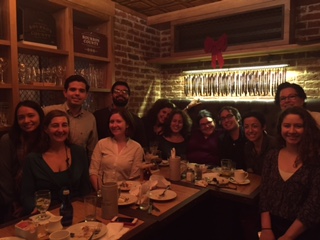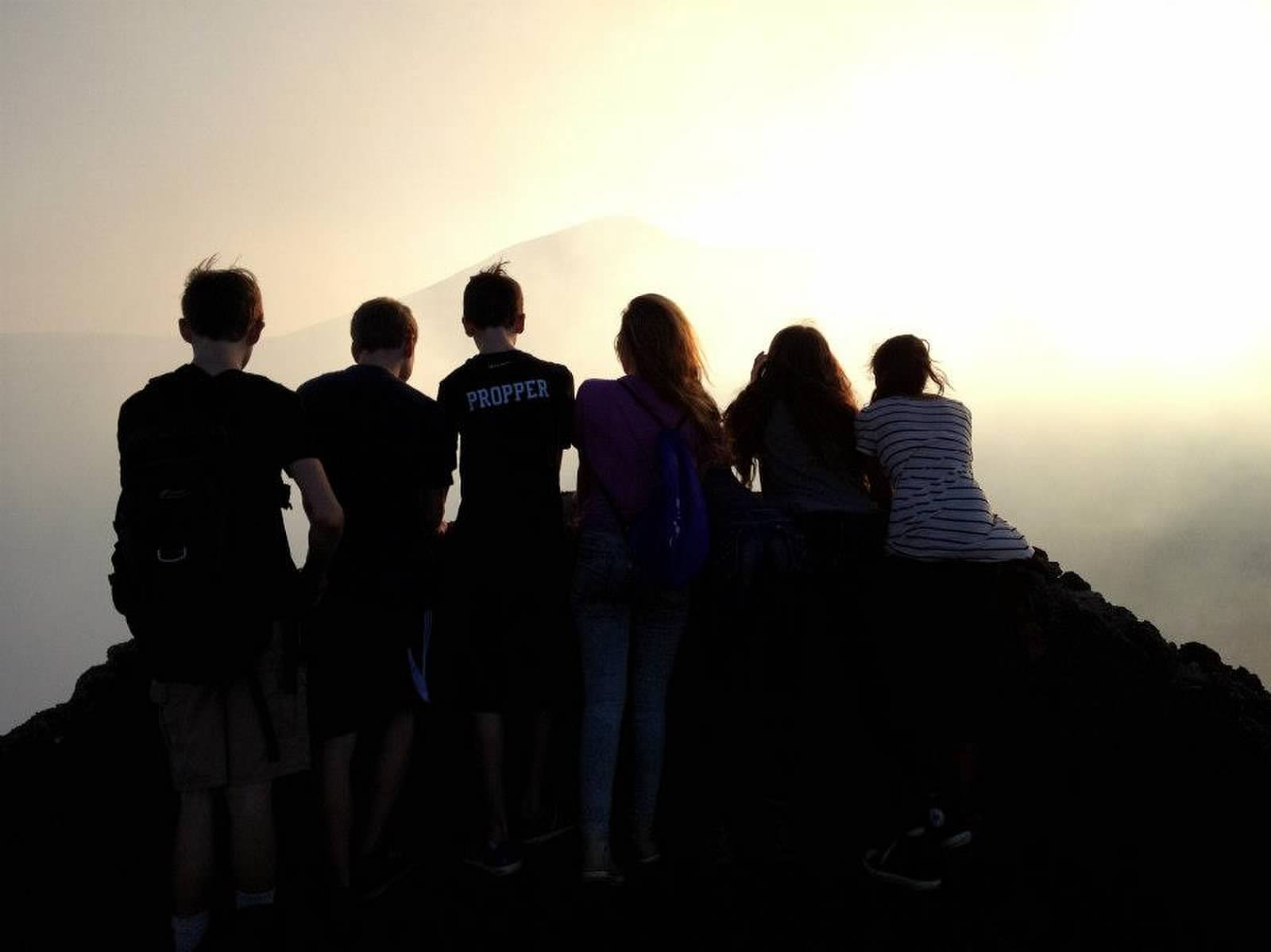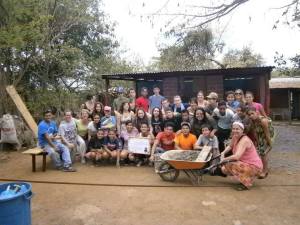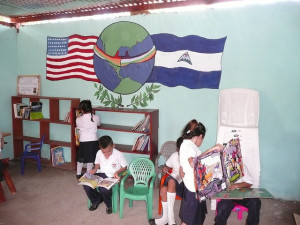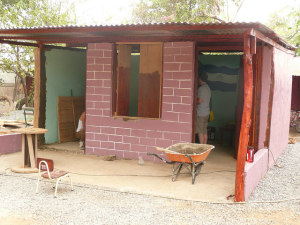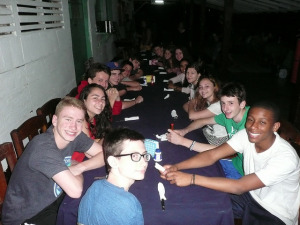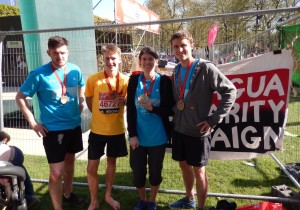Finding New Connections in Nicaragua
/By Dylan Harris and Joey Propper, teen delegates ‘15
We became intrigued to go on a trip to Nicaragua because experiencing a new culture seemed essential to broadening our global horizons. The Dos Pueblos board talked about the strong connections they made with communities in Nicaragua, and how amazing it feels to immerse oneself in a foreign culture. We were sold. The minute we arrived in the capital Managua, we were thrown into speaking Spanish as soon as we unloaded our luggage. Our group mission was to have a meaningful cultural exchange with Nicaraguan teens and finish building a library in Tipitapa, a more rural town than the capital. We also went to visit Ometepe, a two-volcano island that featured something very amazing that we never experienced before—black sand. As New Yorkers, we were first struck by seeing only one-story buildings, but we soon observed how a more rustic and slower lifestyle made the Nicaraguans really value community and family. On this trip, our Spanish skills improved remarkably as we strived to connect with our new friends. We also learned something we did not know about ourselves living in New York—that we enjoy living and working as a group with a unified goal. What we most loved, and the reason we want to return, is the warmth and friendliness of the teens that we have gotten to know and now consider good friends.
Queremos volver pronto!
The PEACE Process : Working Towards Equitable Communities
/Read about the challenges and rewards of the PEACE Process, and how it fits into Dos Pueblos' work in this informative piece by Paul Martin:
Texas Lutheran University MASA. From L to R Brendon Huron, Brittany Flores, Jacob Almaguer, Paul Martin, Jennifer Garcia, Professor Jennifer Mata.
By Paul Martin
I have been struggling to articulate and learn about efforts toward a (mostly theoretical) process of conservation and development of sustainable communities since the 1980s. Over time I have come to call these efforts: positively ethical applied community ecology*. Moreover, in my attempts to begin to get the rubber to meet the road toward facilitating the realization of this process, I have been working with Ogallala Commons in local community gardens along with other organizations. I have especially enjoyed working with Dos Pueblos in New York—a model NGO—on this grassroots PEACE process that is humble yet comprehensive in achieving social and ecological justice and equity.
On Wednesday, April 8th, Lupe Romero Ramsey (Executive Director of Dos Pueblos-NY-Tipitapa, Nicaragua Sister City Project) and I were invited into a wonderful Mexican American Studies class at Texas Lutheran University in Seguin, Texas by Professor Jennifer Mata. We began by getting to know the class and inviting them to express their current goals toward a life of equity for all, and how this has been informed by their class at TLU. Then Lupe gave an overview of Dos Pueblos’ work in Nicaragua that improves access to health, education and environmental awareness, and her life in international development in building sustainable communities with people-centered approaches.
As a class we discussed the reasons for the process of regeneration and conservation toward a resilient, sustainable community and why it makes sense, the need for a bottom-up approach, and the challenges of developing confidence amongst all of the stakeholders including local leaders, the poorest and most disenfranchised.
With a focus on the local Seguin community, and to some extent community gardens, we invited dialogue from the students concerning successes and failures, and how we learn to succeed from our failures. For me, this was particularly empowering and energizing. The students of the class provided real world community reality for the theory—some of it sobering. In fact one delightful student, Brendon, beautifully summarized the rewards of service to local community (All of these very pleasant students provided great input and feedback!) This empowerment and recharging for me was reinforced when I chatted with Brendon later in the week at his workplace in a local food market, and then ran into Profesora Mata (and her lovely family) unexpectedly on two other occasions that week in Seguin. (These students truly made me wish I were “back in the classroom” again.)
Real and lasting relationships are highly rewarding yet challenging. This is truly what PEACE is about. I will be forever be grateful for these relationships afforded to me by Lupe and Dos Pueblos, here in Seguin, Texas, and in Tipitapa, Nicaragua.
…………………..
*This is basically lowering the individual and collective ecological footprints of the haves, curbing population growth rates, empowering the have nots, and regenerating/conserving habitat for other species … and realizing ecological economics. More specific actions are rapid appraisals of community/local ecosystems, facilitating holistic participation, goal-setting/policy development/action plan realization, assessment and replanning. Some necessary, and somewhat more specific actions include ecology across curricula & campuses of community entities, implementation of agroecology, use of appropriate technologies & processes, cooperatives, community supported agriculture, microenterprise financing, more native and perennial crops for agriculture, and appropriate governmental carrots and sticks.
Martin, P.B. and P. Prather. 1991. Sustainable agriculture: a process at the community level. American J. of Alternative Agriculture. 3(1)
Martin, P.B., K. Schantz and P. Sechrist. 2003. Toward conservation and development of sustainable community (locally and globally). Proc. Coloquio Internacional de Desenvolvimento Local, Universidade Catolica Dom Bosco, Campo Grande-MS, Brazil www.ucdb.br/coloquio/arquivos/Paul.pdf
The PEACE Process : Working Towards Equitable Communities
/Read about the challenges and rewards of the PEACE Process, and how it fits into Dos Pueblos' work in this informative piece by Paul Martin:
Texas Lutheran University MASA. From L to R Brendon Huron, Brittany Flores, Jacob Almaguer, Paul Martin, Jennifer Garcia, Professor Jennifer Mata.
By Paul Martin
I have been struggling to articulate and learn about efforts toward a (mostly theoretical) process of conservation and development of sustainable communities since the 1980s. Over time I have come to call these efforts: positively ethical applied community ecology*. Moreover, in my attempts to begin to get the rubber to meet the road toward facilitating the realization of this process, I have been working with Ogallala Commons in local community gardens along with other organizations. I have especially enjoyed working with Dos Pueblos in New York—a model NGO—on this grassroots PEACE process that is humble yet comprehensive in achieving social and ecological justice and equity.
On Wednesday, April 8th, Lupe Romero Ramsey (Executive Director of Dos Pueblos-NY-Tipitapa, Nicaragua Sister City Project) and I were invited into a wonderful Mexican American Studies class at Texas Lutheran University in Seguin, Texas by Professor Jennifer Mata. We began by getting to know the class and inviting them to express their current goals toward a life of equity for all, and how this has been informed by their class at TLU. Then Lupe gave an overview of Dos Pueblos’ work in Nicaragua that improves access to health, education and environmental awareness, and her life in international development in building sustainable communities with people-centered approaches.
As a class we discussed the reasons for the process of regeneration and conservation toward a resilient, sustainable community and why it makes sense, the need for a bottom-up approach, and the challenges of developing confidence amongst all of the stakeholders including local leaders, the poorest and most disenfranchised.
With a focus on the local Seguin community, and to some extent community gardens, we invited dialogue from the students concerning successes and failures, and how we learn to succeed from our failures. For me, this was particularly empowering and energizing. The students of the class provided real world community reality for the theory—some of it sobering. In fact one delightful student, Brendon, beautifully summarized the rewards of service to local community (All of these very pleasant students provided great input and feedback!) This empowerment and recharging for me was reinforced when I chatted with Brendon later in the week at his workplace in a local food market, and then ran into Profesora Mata (and her lovely family) unexpectedly on two other occasions that week in Seguin. (These students truly made me wish I were “back in the classroom” again.)
Real and lasting relationships are highly rewarding yet challenging. This is truly what PEACE is about. I will be forever be grateful for these relationships afforded to me by Lupe and Dos Pueblos, here in Seguin, Texas, and in Tipitapa, Nicaragua.
…………………..
*This is basically lowering the individual and collective ecological footprints of the haves, curbing population growth rates, empowering the have nots, and regenerating/conserving habitat for other species … and realizing ecological economics. More specific actions are rapid appraisals of community/local ecosystems, facilitating holistic participation, goal-setting/policy development/action plan realization, assessment and replanning. Some necessary, and somewhat more specific actions include ecology across curricula & campuses of community entities, implementation of agroecology, use of appropriate technologies & processes, cooperatives, community supported agriculture, microenterprise financing, more native and perennial crops for agriculture, and appropriate governmental carrots and sticks.
Martin, P.B. and P. Prather. 1991. Sustainable agriculture: a process at the community level. American J. of Alternative Agriculture. 3(1)
Martin, P.B., K. Schantz and P. Sechrist. 2003. Toward conservation and development of sustainable community (locally and globally). Proc. Coloquio Internacional de Desenvolvimento Local, Universidade Catolica Dom Bosco, Campo Grande-MS, Brazil www.ucdb.br/coloquio/arquivos/Paul.pdf
We Are Now on Instagram!
/Hello FriendsDos Pueblos is now on Instagram! Follow us @ Dos_Pueblos_Nica to find out what we are up to.

¡Misión Cumplida! : 2015 NY Youth Delegation Home from Building a Library in Tipitapa!
/The 2015 NY Youth Delegation has returned from their Feb. 13-22 trip to Nicaragua. This was the third consecutive Youth Delegation trip undertaken by Dos Pueblos. A group of 17 Youth Delegates and 5 Adult Chaperones, under the leadership of General Counsel Susan Light, Chair Ann Garvin, and Board Member Arlene Tolopko, participated in a busy schedule of cultural exchange and service activities while in Nicaragua.Our delegates hauled, sawed, nailed, sanded, painted, varnished, and completed the final stages of construction and inaugural celebration of the first lending library in San Benito, a community in the Tipitapa Municipality. The library was built with adobe compressed earth blocks made by community members. Inside the library there is a beautiful mural, designed and painted by a collaboration of youth/teens from NYC and Tipitapa. The mural features the Earth encircled by two rainbow arms with clasped hands, flanked by the Nicaraguan and US flags. In Nicaragua, our delegates collaborated with the Arco Iris Youth Team in Tipitapa as well as with students from Saint Dominic’s School in Managua. As part of the trip, the delegates brought 1250 lbs. of books (for the existing and new libraries); school supplies, art supplies, and sports equipment that can be used by the entire community. In addition, boxes of fabric and ribbons were donated to a local women’s sewing cooperative. At the end of the trip the group visited Ometepe, an island in the middle of beautiful Lake Nicaragua, home to two active volcanoes, many organic farms, and habitat for the much beloved Howler Monkey.
Congratulations to the Youth Delegation on a very successful trip! ¡Enhorabuena, chicos!
Watch Our Youth Delegates in Action!
/Have you ever wished you could experience Tipitapa from the viewpoint of our Youth Delegates? One of our 2015 delegates, Caleb Berman, created a video using footage from the 2015 Youth Delegation trip to Nicaragua. In this video you can witness the final stages of construction of the San Benito Lending Library, fun times with our Nicaraguan friends, and the formation of strong friendship bonds. Check out Caleb's video here:
[embed]https://www.youtube.com/watch?v=G4Jw8Tnx87c[/embed]
Why Aren't Nicaragua's Children Fleeing to the U.S?
/Click here to read this interesting article!
'Jappy' Nicaragua
/Pharrell's hit "Happy" has become a global sensation leading to several different productions and interpretations of the song from countries all over the world. This video will no doubt brighten up your day and demonstrate the energy and playfulness of Nicaraguans. Enjoy!
Meet the new intern: Laine Mackey
/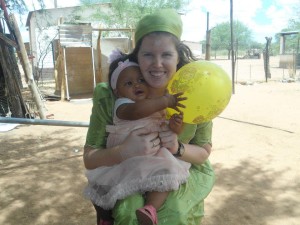
The picture above was taken during my time as a PCV in Namibia. The adorable girl in my lap, Naledi, was born the first week I arrived in my village. This picture was taken on the day of her baptism (hence the cute pink dress). The dress I'm wearing reflects the clothes of the tribe I lived and worked with, the Damaras. Fun fact about Damaras: they speak a Khoisan (click) language called Khoekhoegowab. Being a Peace Corps Volunteer taught me so many invaluable things, but what stands out the most is the importance of sustainability. This is why I am so excited to be working for Dos Pueblos. This organization's commitment to improving social conditions and collaborating with the community is evidenced by its successes and longevity. I look forward to spreading the mission and work of this organization.
26.2 miles on London's roads for Tipitapa
/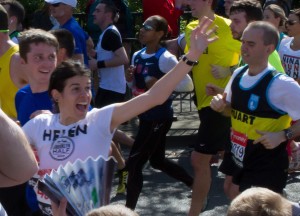
Congratulations to Dos Pueblos' Board Member Helen Shannon, who just (successfully) ran the London Marathon!
On Sunday, April 13th, Helen and several teammates ran the marathon, raisings funds for Dos Pueblos and The Nicaragua Solidarity Campaign (NSC) by doing so. The NSC "works in solidarity with Nicaraguan organisations and social movements fighting for social and economic justice by promoting and seeking support for their activities in the UK". Please visit their website for more information.
Helen completed the race with a teammate in 3 hours, 56 minutes, and 29 seconds, and shared that, "to do all this on behalf of projects to support and strengthen communities in Nicaragua was an honour, and especially important right now since Nicaragua is in the news once again due to a natural disaster - this time a series of earthquake tremors that are rocking the capital. Thinking of our friends there and sending them our thoughts".
Helen with Teammates of the Nicaragua Solidarity Campaign, who ran for the NSC and for Dos Pueblos.
Congratulations to all the runners and thank you for your generosity and commitment!
Nicaragua on High Alert After Recent Earthquakes
/Over the last 2 weeks, Nicaragua has experienced 3 serious earthquakes, the largest of which measured 6.6 on the Richter Scale (somewhere between "Noteworthy" and "High", according to the scale), and which was also felt in El Salvador and Costa Rica. The government has placed the country on high alert and advised citizens to sleep outside until further notice, removed from the risk of shaky infrastructure, and is taking proactive measures, such as erecting tent hospitals, in anticipation of disaster.
The BBC reports that "two have died and dozens have been injured". According to ABC News, this recent bout of earthquakes is resurfacing memories of the 1972 earthquake, when 10,000 people lost their lives, and is generating anxiety about a repeat occurrence. The 1972 quake hit the capital city of Managua and destroyed a large part of the city. It is possible that the fault line running under Managua has been reactivated, although that cannot be confirmed at this time.
Dos Pueblos has been in contact with our community in Nicaragua and can report that no one has been harmed in Tipitapa. Please keep our Nicaraguan brethren in your thoughts during this time of high anxiety.
A Wonderful Evening Supporting Amazing Work
/A heartfelt thank you to everyone who came to the Spring fundraising event last Friday! It was a fantastic night all around. The foot-stomping music by Jesse Lége and the Bayou Brew got many of us out on the dance floor. Delicious cocktails made by the staff of Cafe Tallulah added to the all around fun ambiance of the downstairs speakeasy. The live and silent auctions raised some of the much-needed funds for the work Dos Pueblos is doing in Nicaragua. And the wonderful supporters of Dos Pueblos provided lively and entertaining conversation all evening long. All in all, the event was a big success and a lot of fun for everyone involved!
If you weren't able to attend Friday's festivities, you can still contribute to Dos Pueblos! Your support brings human rights, children's literacy, economic empowerment and clean water to all.
And be sure to learn more about our work by:
- Checking out our Spring 2013 Delegation Report
- Visiting our August 2013 Medical Delegation webpage
- Reading our appeal
Bring your dancing shoes on June 14th!
/Join us at our Spring Fundraiser Fiesta and support health, education and human rights. Your solidarity with Tipitapa, Nicaragua means that we can provide clean water to families, libraries to children, and health and economic empowerment to women.
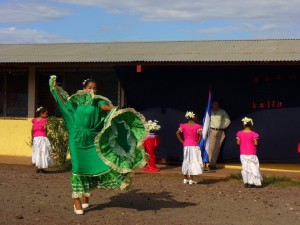
Featuring Jesse Lége, the master of foot-stompin’ Cajun dance hall music (put on those dancing shoes and have a listen: http://tinyurl.com/cjsaqj5).
And if that wasn't enough reason to celebrate with us, this year we are holding our event at the recently opened Cafe Tallulah, an exclusive and beautiful bistro on the Upper West Side. Tailor-made cocktails will be available (with bartenders from Employees Only) to help get you in the mood for dancing!
The details:
Friday, June 14th, 2013
6:00pm - 9:00pm
@ Cafe Tallulah
240 Columbus Ave
New York, NY 10023
See Tipitapa through the eyes of our youth delegates
/Dos Pueblos led a youth delegation to Tipitapa, Nicaragua in February of 2013. It was a wonderful experience for the teens---both those from the US and the Nicaraguan friends they made. In addition to exploring volcanoes and swimming in lakes, the U.S. students had the chance to learn about the culture and history of the region and participate in community-building projects. Watch the amazing video that Esther Duran, documentary filmmaker and mom to youth delegate Miranda Ranghelli, created:
Meet Lily, the New Intern!
/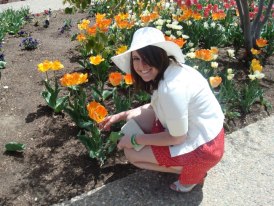 Hello Everyone!
My name is Lily and I am the new Development and Communications Intern with the Dos Pueblos organization. I am truly grateful and excited for this opportunity to work with such an inspiring and welcoming team. As the new intern, I will be working under the guidance of Lupe on many projects and activities but primarily the event planning and outreach, foundation research, and managing the social media and database sites.
Hello Everyone!
My name is Lily and I am the new Development and Communications Intern with the Dos Pueblos organization. I am truly grateful and excited for this opportunity to work with such an inspiring and welcoming team. As the new intern, I will be working under the guidance of Lupe on many projects and activities but primarily the event planning and outreach, foundation research, and managing the social media and database sites.
I am currently a graduate student at The New School for Public Engagement pursuing my Master of Arts Degree in International Affairs with a concentration in development. Eager to join the many New School alumni at this organization, I am hoping that I can provide any useful ideas and skills that I have learned with the Dos Pueblos community. Apart from studying for my degree, I also work for the English Language Studies Department at the New School. In my free time I enjoy following in my father’s footsteps by taking photos, taking in the city culture, undertaking new adventures, and travelling as much as I can.
Dos Pueblos to me, is an excellent opportunity to truly make an impact on the lives of others. I am thrilled to work for a non-profit that is dedicated to the improvement of the living standards of the people of Nicaragua. Personally, I feel that growth and development comes from the individual needs and wants of the people who have been greatly impacted by poverty. Everyone deserves clean water, proper nutrition, an education, healthcare, and so forth. These are luxuries that most of us Americans have and I feel it is my responsibility to assist those in need and lend a hand where I can. I believe that with appropriate communication, respect, and understanding of diverse communities and cultures, our society can positively aid and improve the dire situations of others.
Many people ask me how I got interested in International Affairs and development. I think that came from the values that my family instilled in me. My family and I emigrated from the very poor, disorderly country of Bulgaria when I was pretty young. Watching my parents work so hard to give me the opportunities they never had was very humbling and inspiring. They encouraged me to be respectful, compassionate of others, and to be understanding and moved by the different and beautiful cultures surrounding us. I had the ability to travel a lot when I was younger, learning more and more about this fascinating world we live in.
Eventually, I knew that I was meant for a greater good, some way to help others. Learning about the tragedies and hardships going on in the world really affected me. I became very interested in conflict studies and in particular, genocide. I was appalled and greatly moved by the atrocities occurring all over. With the implications involved in politics, I decided the most reasonable and rewarding way to go about helping those enduring such hardship was through the development route. And now here I am!
That’s all about me! Thank you everyone for having me on board. I look forward to meeting all of you at Dos Pueblos and I hope to discover more about the people of Tipitapa and their path to success and happiness.
Sincerely,
Lily
A Great Sense of Community in Tipitapa
/Paul B. Martin, PhD, joined Dos Pueblos on our recent delegation to Nicaragua. In his blog post, he shares some of the highlights of the trip.
Read MoreNicaragua Delegation Notes, by David Ment
/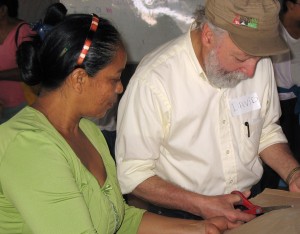 It was a great privilege and opportunity to travel with the Dos Pueblos delegation and visit the communities of Tipitapa. The trip overall was a success due to its careful planning, and also due to the wonderful group of people on it: Lupe, Helen, Sarah, Amy, Steve, Paul; I learned much from everybody.
The citizens of Tipitapa were amazingly open to showing us their successes, problems, and living conditions. This must reflect both their positive and cooperative attitudes and also the long-term intensive work of Rosa and others in building confidence and relationships. People like Marina and Estela were unbelievable in their dedication and it was an honor to meet them.
It was a great privilege and opportunity to travel with the Dos Pueblos delegation and visit the communities of Tipitapa. The trip overall was a success due to its careful planning, and also due to the wonderful group of people on it: Lupe, Helen, Sarah, Amy, Steve, Paul; I learned much from everybody.
The citizens of Tipitapa were amazingly open to showing us their successes, problems, and living conditions. This must reflect both their positive and cooperative attitudes and also the long-term intensive work of Rosa and others in building confidence and relationships. People like Marina and Estela were unbelievable in their dedication and it was an honor to meet them.
The first days revolved around water projects, and I gradually came to appreciate the careful way our community visits proceeded. We started in Via Japon where the pump was turned by hand and buckets were carried by hand or on the head. We visited communities where handcarts and burros took over the task of carrying, where the pumps were electrified, and ultimately, where the electric pumps fed networks of plastic pipes to bring the water to each home.
Among the key elements for the water projects’ success seem to be the continuing commitment of the community; the creation of committees with a structure to support water planning and assessments; the backup of that structure with the formal CAPS legislation and staff; the ongoing coordination, encouragement, and monitoring by Rosa, which helps keep community members positive; the physical task of infrastructure construction at this level, supported by CAPS; and the ability of Dos Pueblos to provide financial resources where needed. That last sentence is a bit long. But maybe that is the message: you need all of those elements to make real permanent community progress. It has clearly taken years of hard work by Dos Pueblos, both by folks in NYC and Tipitapa, to reach this stage.
In Ciudadela San Martin, the little children’s library was a gem. It is a model of practical community self-help that can be readily replicated. Essential is the heartfelt adoption of the project by a volunteer librarian, and providing books is a natural for partners like Dos Pueblos. A step for the future could be to partner with an educator or librarian from the university or other agency who could select books that can be purchased in Managua and thus avoid international shipping.
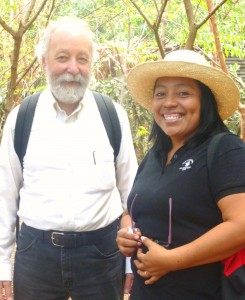 In the same community we also visited a health clinic, which was part constructed by Dos Pueblos. The nurse was very clear in suggesting that planning and management could be improved (for example the seemingly random staff turnover, carried out by the Ministry of Health and a continuous problem for Dos Pueblos in trying to develop long-term relations here). It was often hard to sort out the overlapping problems of a shortage of health centers and transportation in such rural communities. At times, I recall feeling that problems raised in the communities could be solved by effective transport to medical services; perhaps an “access-a-ride” service would produce the greatest improvement in access to care.
In the same community we also visited a health clinic, which was part constructed by Dos Pueblos. The nurse was very clear in suggesting that planning and management could be improved (for example the seemingly random staff turnover, carried out by the Ministry of Health and a continuous problem for Dos Pueblos in trying to develop long-term relations here). It was often hard to sort out the overlapping problems of a shortage of health centers and transportation in such rural communities. At times, I recall feeling that problems raised in the communities could be solved by effective transport to medical services; perhaps an “access-a-ride” service would produce the greatest improvement in access to care.
Perhaps the most emotionally wrenching project was the special education class: the attempt by volunteer Estela to teach kids with a broad range of disabilities, many of which were serious. More impressive to me was the level of support she was receiving from so many members of the community – the willingness of so many people to spend two days at our workshop really struck me. Looking to the future of this new project however, I think it now needs some of the support elements that the water projects had: formal recognition, technical and political support, linkages with medical services, and of course financial support.
I guess I end where I began. It was such an honor to meet the people of these communities who are making such an effort to build from such a difficult starting place.



